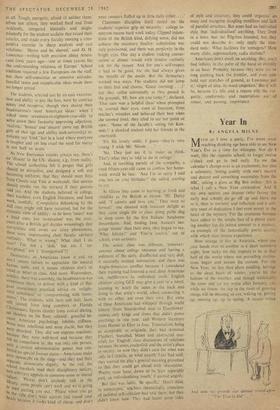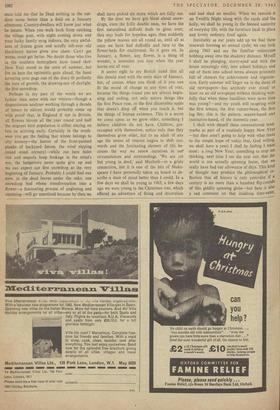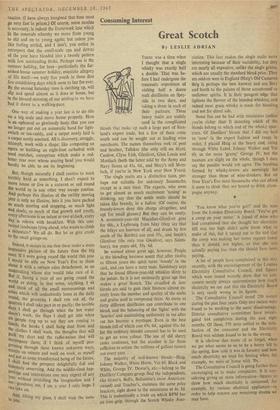Year In
By ANGELA MILNE
Mucii as I love a party, I've never since reaching thinking age been able to see New Year's Eve as a time for -whoopee. Nor do I want, like the opposite school, to forget twelve o'clock and go to bed early. To me the calendar's change-over is an excitement, but also a solemnity. Sitting quietly with one's nearest and dearest and something seasonable from the BBC, raising a glass as Big Ben strikes—this is what I call a New Year celebration. And if my own nearest and dearest (who favour the early bed school) do, go off up and leave me to it, then in memory and reflection and a soli- tary toast of dedication I feel even nearer to the heart of the mystery. For the overtones humans have added to the simple fact of a planet start- ing another lap do indeed amount to a mystery, an example of the fantastically poetic quality with which man invests experience.
How strange to live in Australia, where one sear hands over to another in a short summer's night; how lucky (in this respect) to be in that half of the world where our prevailing civilisa- tions began and season fits custom. For the New Year. no less than plum pudding, belongs to the dead heart of winter; you've hit the bottom of the weather, and though statistically the snow and ice are worse after January, vet, while we freeze, the sap in the roots of growing things will be opening an eye, waking up, getting up, moving up, up to spring. A nature writer And now It, pr( sem our annual r,noul-up-- 1 h., If or in Sin". .
once told me that he liked nothing in the out- door scene better than a field on a January afternoon. Country-dwellers will know just what he means. When you walk back from catching the village post, with night coming down and your lucky family snug indoors, the very awful- ness of frozen grass and scruffy left-over old blackberry leaves gives you cheer. Can't get worse, must get better. No doubt those who live in the southern hemisphere have tuned their New Year mood to the crest of summer, but for us here the optimistic gaze ahead, the hand hovering over page one of the diary fit perfectly the turn of growth, the drawing-out of daylight, the first snowdrop.
Perhaps in my part of the world we are luckier than some with our winters—though a dispassionate analyser working through a decade of letters to editors would probably come up with proof that, in England if not in Britain, all flowers bloom all the year round and half the migrant bird population is either staying on late or arriving early. Certainly in the south- west you get the feeling that winter belongs to city scenery—the horror of the frost-painted planks of backyard fences, the wind nipping round street corners! —while out here holm oak and sequoia keep boskage in the mind's eye, the hedgerows never quite give up and we can expect our first snowdrop at the very beginning of January. Probably I could find one now, in the dead leaves under the oaks; one snowdrop bud whose transformation into a flower—a fascinating process of unglueing and capsizing—will go unnoticed because by then we shall have picked six more which are fully out.
By the time we have got 'blasd about snow- drops, even the frilly double ones, we have the first naturalised daffodil buds to gloat over; they stay buds for hopeless ages, then suddenly the yellow masses are all round us, until all at once we have had daffodils and turn to the flower-beds for excitement. So it goes on. In January, a flower, any flower, is a thing of wonder, a sensation you lose when the year bursts out all over.
It seems right to my British mind that all this should start with the early days of January, but, of course, when you think of it you can fit the mood of change to any time of year, because the things round you are always begin- ning and ending; not only nature things like the first Peace rose, or the first discernible apple that doesn't drop off when you touch it, but the things of human existence. This is a secret we come upon as we grow older, something I believe children do not have. Children, pre- occupied with themselves, notice only that they themselves grow older, but to an adult of any age the centre of interest begins to shift out- wards and the fascinating element of life be- comes the way we renew ourselves in our circumstances and surroundings. 'We are yet but young in deed,' said Macbeth—in a grisly connection, but it is one of the bits of Shake- speare I have personally taken on board to de- scribe a state of mind better than I could. In a few days we shall be young in 1963; a few days ago we were young in the Christmas tree, which offered an adventure of fixing and decoration
and had shed no needles. When we remove it on Twelfth Night along with the cards and the holly, we shall be young in the blessed austerity of everyday life, with the furniture back in place and lovely ordinary food again.
Inevitably as our years add up we find these renewals forming an annual cycle; we can look along 1963 and see the familiar milestones bobbing away into the shadowy distance. Myself I shall be plunging, starry-eyed and with the house amazingly tidy, into school holidays and out of them into school terms always pristinely full of chances for achievement and organisa- tion. Early summer will linger on in the dates of old newspapers—has anybody ever stood or leant on an old newspaper without thinking wist- fully that when those headlines were news time was young?—and my youth will re-spring with the first lettuce, the first runner-bean, the first log fire; this is the pattern, season-based and institution-based, of the domestic year.
I shall wish myself these unsensational land- marks as part of a routinely happy New Year —but they aren't going to help with what (next to the simple hope of today that, God willing, we shall have a year) I shall be feeling I want most: a long New Year; something to stop me thinking, next time I see the year out, that the world is not actually spinning faster, that yore really have had our allowance of days. This kind of thought may produce the philosophical. re- flection that all history is only yesterday if a century is no more than a hundred flip-rounds of this giddily spinning globe—but here is also a sad comment on that insidious time-eater, routine. (I have always imagined that time must go very fast in prison.) Of course, some routine is necessary, is indeed the framework into which fit the renewals whereby we move from young to old and on to young again; but unless you like feeling settled, and I don't, you notice in retrospect that the small-scale ups and downs of the year have blended into a tweedy pattern With few outstanding blobs. Perhaps one is the summer holiday, for here—particularly the fur- nished-house summer holiday, exquisite allegory of life itself—we truly live youth in those first few establishing days which seem to last for ever. By the second Saturday time is catching up, will Slip and speed almost as it does at home, but in the blessed morning of our settling-in we have had it down to a walking-pace.
One way of making a year last is to do this on a big scale and move house properly. Here is an upheaval so gloriously basic that you can no longer put out an automatic hand for light- switch or tea-caddy, and a carpet newly laid is a carpet newly assessed. All is discovery, struggle, triumph, work with a shape; like composing an opera or building an eight-foot cathedral with Used matches, enterprises which make a red- letter year over whose soaring head you would hardly be able to see its beginning.
But, though naturally I shall resolve to work terribly hard at something, I shan't expect to move house or live in a caravan or sail round the world or in any other way escape routine. And perhaps this illusion of the swiftly moving Year is only an illusion; into it you have packed SO much starting and stopping, so much light and shade, so much of that growth and youth; every afternoon is an infant at two o'clock, every day is reborn with breakfast. With this con- toured landscape lying ahead, who wants to climb a mountain? We all do. But let us give credit to the small goings-on.
Indeed, it occurs to me that these make a more impressive picture of the future than the big Ones. If I were going round the world this year I Would be able on New Year's Eve to think about it with a certain calm detachment, as an u_ndertaking whose size would take care of it. But if, facing a year of not going round the World or doing, in that sense, anything, I sit and think of all the small surmountings and crises which will undoubtedly loom in the daily round, the groceries I shall run out of, the cl.Uarrels I shall take part in or pacify; the terrible cl..ays I shall go through when the hot water doesn't work, the flaps I shall get into when ,stx people ring up to say they are coming to '_11neh; the books I shall bang dust from and the clothes I shall wash, the thoughts that will Pack My days and the radio-noises that will accompany them; if I think of myself pro- rngressing through these known unknown ways, 'flute on minute and week on week, as myself and not as some transformed being of the future, hideously find the prospect delightfully full and unnerving. Add the middle-sized hap- Yeara vcnings and innovations one may expect of any without stretching the imagination and I goodness me, I see a year I only hope I eau take on.
And, lifting my glass, I shall wish the same to you.
































 Previous page
Previous page